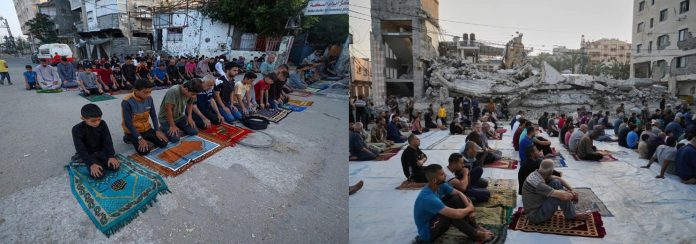– M Rafi Ahmed
Sadness writ large on the faces of Palestinians as war, hunger and displacement deprived them of the joy of celebrating the Festival of Sacrifice (Eid al-Adha). Living in one of the worst conditions following the ongoing genocidal war resulting in loss of many lives, dwellings and properties, the people more so the children are in starvation as food supplies have been completely stopped as Israeli army have blocked all the entry points to Gaza.
The devastating circumstances have overshadowed even the most cherished memories of past Eids. Today, only around 20% of Gaza’s total area remains accessible for civilians, as the Israeli army has declared most of the Strip as military zones, launching incursions and applying a scorched earth policy. As a result, the dominant scenes across Gaza are those of overcrowded tent camps and shelter centres. The remaining partially damaged homes are overwhelmed with displaced residents and their extended families.
With much of Gaza in rubble, men, women and children were forced to hold the traditional Eid al-Adha prayers in the open air and with food supplies dwindling, families were having to make do with what they could scrape together for the three-day feast. “This is the worst feast that the Palestinian people have experienced because of the unjust war against the Palestinian people,” said Kamel Emran after attending prayers in the southern city of Khan Younis. “There is no food, no flour, no shelter, no mosques, no homes, no mattresses. … The conditions are very, very harsh.”
The Islamic holiday begins on the 10th day of the Islamic lunar month of Dhul-Hijjah, during the Hajj season in Saudi Arabia. For the second year, Muslims in Gaza were not able to travel to Saudi Arabia to perform the traditional pilgrimage. In Gaza City on Friday, Sanaa Al-Ghola, a displaced woman from Shejaiyah, stood in the rubble of a badly damaged graveyard near a partially collapsed mosque. She had come to pray for her son, Mohamed al-Ghoul, who she said was killed in shelling last month after going to his grandfather’s house to get flour. His father was wounded in the attack.
“We lost our home, money, and everything,” she said, crying as she held her son’s photo. “There is no more Eid after you’re gone, my son.” Families at a displacement tent camp in Muwasi faced a grim first day of Eid al-Adha. “There are no Eid celebrations now as there is no new clothes or sacrificial meat, or monetary gifts, or joy,” she said, reminiscing over Eid days before the war when the children had meat. “My son went out and tried to celebrate Eid and was scared of the warplane, so he came back.”
With the Gaza Strip devastated by war and siege, Palestinians struggled Thursday to celebrate one of the most important Islamic holidays. To mark Eid al-Adha, Muslims traditionally slaughter a sheep, or other sacrificial animals and give away part of the meat to the poor as an act of charity. Then they have a big family meal with sweets. Children get gifts of new clothes.
Sadly, no fresh meat entered Gaza for three months. Israel has blocked shipments of food and other aid to pressure Hamas to release hostages taken in the Oct. 7, 2023, attack that started the war. And nearly all the territory’s homegrown sheep, cattle and goats are dead after 20 months of Israeli bombardment and ground offensives. Some of the little livestock left was on sale at a makeshift pen set up in the vast tent camp of Muwasi in the southern part of Gaza’s Mediterranean coast.
None could afford to buy. A few people came to look at the sheep and goats, along with a cow and a camel. Some kids laughed watching the animals and called out the prayers connected to the holiday. “I can’t even buy bread. No meat, no vegetables,” said Abdel Rahman Madi. “The prices are astronomical.” The Eid commemorates the test of faith of the Prophet Ibrahim and his willingness to sacrifice his son as an act of submission to Almighty.
Almost the entire population of more than 2 million people have been driven from their homes, and most have had to move multiple times to escape Israeli offensives. WHO termed the situation as one of the world’s worst hunger crises. Meanwhile, the International Red Cross Committee chief expressed concern that the Palestinians were subjected to a situation similar to “Hell”. Palestinians had to sacrifice the celebration of “Festival of Sacrifice” (Eid al-Adha).




